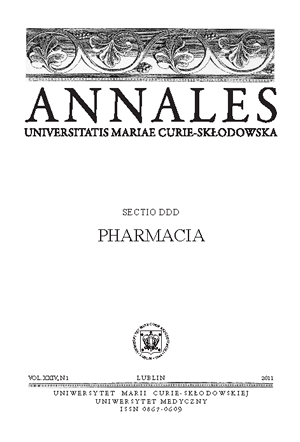Behavioral impairment induced by dexamethasone: effect of ACTH4-9
Keywords:
glucocorticoids, dexamethasone, ACTH4-9, behavioral tests, neurodegeneration, neuroprotection, miceAbstract
Long-term treatment with glucocorticoids (GCs) and their preparations, e.g. dexamethasone (DEX) can induce neuronal damage of the brain, especially hippocampus (with high concentration of GCs receptors) that plays an important role in memory, mood and behavior.
Several earlier studies showed neuroprotective effect of ACTH4-9 -(-synthetic adrenocorticotropin-4-9-analog) in some models of central and peripheral neuronal degeneration. The aim of the present study was to investigate influence of ACTH4-9 (at the dose of 50 mg/kg/twice of week) on impairment of behavioral effects of the chronic treatment with DEX in mice. The results of present study showed that DEX (8 or 16 mg/kg/day for 14 days) impaired the motor coordination (“chimney” test), the locomotor activity during 60 min of observation and also decreased memory acquisition in the step-through passive avoidance test (especially at the dose of 16 mg/kg/day). Moreover, DEX, at either doses, evoked the significant lethality and decreased the body weight of mice during 28 days of experiment. ACTH4-9 improved the behavioral effects but not diminished of the lethality of mice. The above findings confirm the neuroprotective properties of ACTH4-9.
References
1. Antonawicz F.J., Miller G., Gigsby D.C. et al.: Regulation of ischemic cell death by glucocorticoids and adrenocorticotropic hormone. Neurosci., 88, 319, 1999.
2. Abrahám I., Veenema A.H., Nyakas C. et al.: Effect of corticosterone and adrenalectomy on NMDA-induced cholinergic cell death in rat magnocellular nucleus basalis. J. Neuroendocrinol., 9, 713, 1997.
3. Boissier J.R., Tardy J., Diverres J.C.: Une nouvelle méthode simple pour explorer l´action “tranquillisante”: le test de la cheminée. Méd. Exp. (Basel), 3, 81, 1960.
4. Brown E.S., Rush A.J., McEwen B.S.: Hippocampal remodeling and damage by corticosteroids: implications for mood disorders. Neuropsychopharmacol., 21, 474, 1999.
5. Chen J., Adachi N., Tsubota S. et al.: Dexamethasone augments ischemia- induced extracelluralar accumulation of glutamate in gerbil hippocampus. Eur. J. Pharmacol., 347, 67, 1998.
6. Danilczuk Z., Ossowska G., Wróbel A. et al.: Glucocorticoids modulate behavioral effects induced by dopaminergic agonists in rats. Pol. J. Pharmacol., 53, 467, 2001.
7. Danilczuk Z., Ossowska G., Łupina T. et al.: Effect of NMDA receptor antagonists on behavioral impairment induced by chronic treatment with dexamethasone. Pharmacol. Rep., 57, 47, 2005.
8. Danilczuk Z., Sekita-Krzak J., Łupina T. et al.: Influence of dizocilpine (MK-801) on neurotoxic effect of dexamethasone: Behavioral and histological studies. Acta Neurobiol. Exp., 66, 215, 2006.
9. De Quervain D.J., Roozendaal B., McGaugh J.L.: Stress and glucocorticoids impair retrieval of long-term spatial memory. Nature, 394, 787, 1998.
10. De Wied D., De Kloet E.R.: Pro-opiomelanocortin (POMC) as homeostatic control system. Ann. NY Acad. Sci., 521, 328, 1987.
11. Flavin M.P.: Influence of dexamethasone on neurotoxicity caused by oxygen and glucose deprivation in vitro. Exp. Neurol., 139, 34, 1996.
12. Griffiths M.R., Cooper A.J., Barber D.J. et al.: Pharmacological mechanisms mediating phencyclidine-induced apoptosis of striatopallidal neurons: the roles of glutamate, dopamine, acetylcholine and cortocosteroids. Brain Res., 855, 1, 2000.
13. Hamers F., Pette Ch., Neijt J.P. et al.: ACTH-(4-9) analog, ORG 2166, prevents taxol-induced neuropathy in rats. Eur. J. Pharmacol., 233, 177, 1993.
14. Haynes L.E., Griffiths M.R., Hyde R.E. et al.: Dexamethasone induces limited apoptosis and extensive sublethal damage to specific subregions of the striatum and hippocampus: implications for mood disorders. Neurosci., 104, 57, 2001.
15. Herz R.C.G., Kasbergen C.M., Versteeg D.H.G. et al.: The effect of the adrenocorticotropin-(4-9) anlogue, ORG 2766, and of dizolcipine (MK-801) on infarct volume in rat brain. Eur. J. Pharmacol., 346, 159, 1998.
16. Horváth K.M., Abraham I.M., Harkany T. et al.: Postnatal treatment with ACTH (4-9) analog ORG 2766 attenuates N-methyl-D-aspartate-induced excitotoxicity in rats nucleus vasalis in adulthood. Eur. J. Pharmacol., 405, 33, 2000.
17. Hwang I.K., Yoo K.Y., Park J.K. et al.: Ischemia-related changes of adrenocorticotropic hormone immunoreactivity and its protective effect in gerbil hippocampus after transient forebrain ischemia. Neurosci. 126, 871, 2004.
18. McIntosh L.J., Sapolsky R.: Glucocorticoids increase the accumulation of reactive oxygen species and enhance adriamycin-induced toxicity in neuronal culture. Expl. Neurol., 141, 201, 1996.
19. Newcomer J.W., Selke G., Melson A.K. et al.: Decreased memory performance in healthy humans induced by stress-level cortisol treatment. Arch. Gen. Psychiatry, 56, 527, 1999.
20. Sekita-Krzak J., Żebrowska-Łupina I., Czerny K. et al.: Neuroprotective effect of ACTH(4-9) in degeneration of hippocampal nerve cells caused by dexamethasone: morphological, immunocytochemical and ultrastructural studies. Acta Neurobiol. Exp., 63, 1, 2003.
21. Stengs C.H.M., Klis S.F.L., Huizing E.H. et al.: Protecive effects of a neurotrophic ACTH4-9 analog on cisplatin ototoxicity in relation to the cispaltin dose: an electrocochleographic study in albino guinea pigs. Hearing Res., 124, 108, 1998.
22. van Rijzingen I.M., Gispen W.H., Dam R. et al.: Chronic and intra-amygdala administrations of the ACTH4-9 analog OR 2766 modulate behavioral changes after manipulation of NMDA-receptor activity. Brain Res., 22, 200, 1996.
23. van Rijzingen I.M., Gispen W.H., Spruijt B.M. The ACTH(4-9) analog ORG 2766 and recovery after brain damage in animal models – a review. Behav. Brain Res., 74, 1, 1996.
24. Venault P., Chapouthier G., de Carvalho L.P. et al.: Benzodiazepines impair and betacorbolines enhance performance in learning and memory tasks. Nature, 321, 864, 1986.
25. Wolkowitz O.M., Reus V.I., Canick J. et al.: Glucocorticoid medication, memory and steroid psychosis in medical illness. Ann. NY Acad. Sci., 823, 81, 1997.
26. Żebrowska-Łupina I., Pietrasiewicz T., Ossowska G. et al.: ACTH4-9 analogue facilitates the antiimmobility effect of antidepressants and dopamine agonists in swimming rats. J. Physiol. Pharmacol., 48, 263, 1997.
Downloads
Published
Issue
Section
License
Copyright (c) 2011 Authors

This work is licensed under a Creative Commons Attribution-NonCommercial-NoDerivatives 3.0 Unported License.


